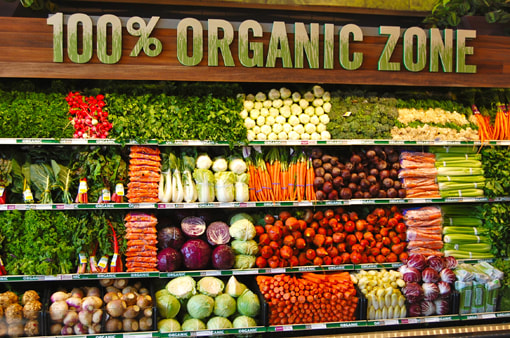|
While studies aimed at determining the reason for dogs eating grass or plants are inconclusive, we do know that does are omnivores and are capable of benefitting from the phytonutrients and fiber found in plants and vegetables. We also know that in a survey conducted by U.C. Davis of over 3,000 pet owners, 68% of respondents related that their dogs ingest plants on a daily or weekly basis. Wild canids and felids in nature are known to eat grass and plants—plant material has been found in 2% to 74% of scats and stomach content samples of wolves and cougars. In other words, wild dogs diets include phytonutrition not normally found in conventional domesticated dog diets - especially ones that have been processed at high temperatures thereby destroying the large majority of nutrition that may have once been present.
So, should you let your dog eat grass? Definitely not if there's a chance the grass contains pesticide or fertilizer residue, as these contain chemicals highly toxic to dogs. A better, safer solution is green vegetables. Green vegetables are a great source of fiber, vitamins, minerals and phytonutrients that can help support the health of your pup, boost immunity and assist in the digestive process. Further information about dogs and vegetables may be found here. - Contributing Editor M.G.
0 Comments
We thought that you may find the following article from Seattle Organic Restaurants interesting. Just another reason to eat organic!
"Eating organic foods can reduce the level of pesticides by 89% researchers say. According to a study published in the Journal of Environmental Research, participants who ate 80% organicdiet had 89% less pesticide residue in their urine compared to those who ate conventionally grown food. The study was performed in Melbourne, Australia with non-smoking participants aged between 18 and 65. In this study, the pesticide level in the urine of those who ate conventionally grown food is a representative of pesticide levels in the urine of millions of people who eat foods laced with high levels of pesticides and GMOs. "High levels of dialkylphosphates (DAPs), non-selective organophosphate metabolites, were found in their urine of those who mostly ate a conventional diet contaminated with high levels of pesticides and GMO foods. The participants who mostly ate organic produce had much lower level of DPA compared to those who did not. Organophosphate pesticides are originally derived from World War II nerve agents: The researchers are mainly concerned about the health impacts of organophosphate (OPs) on consumers. According to a CDC report, just in 2001, over 73 million pounds of organophosphate were used on US crops. One of the known health problems of organophosphate is the fact that it could inhibit neurotransmitter known as cholinesterase that carries signals between nerves and muscles. The results could poison victims to suffocate due to paralysis or fill up their lungs with fluid. Those with lower immune system, elderly and children are at higher risk of organophosphate pesticide poisoning. Conventional fruits and vegetables including peaches, apples, grapes and pears are some of the most common foods treated with organophosphate. Here are some of the health problems of organophosphate: Developmental problems: Organophosphate could interfere with healthy neurological development causing lower cognitive function and behavioral problems. Studies show that kids who are exposed to OPs are at higher risk of developing ADD and ADHD. Infertility: Like endocrine disrupters, organophosphate could have a negative impact on human reproductive system and reduce the level of testosterone and sex hormones. Exposure to OPs could also have an adverse effect on male fertility. Cancer: Several studies and CDC report have linked OPs to increase in risk of cancers including leukemia and lymphoma. "Parkinson’s disease: Studies show that Ops has negative impact on the brain and can lead to neurological problems including Parkinson’s Disease. Eat Organic! A 2012 report by the American Academy of Pediatricians (AAP) shows that eating organic produce can significantly reduce the exposure to pesticides and offer many health advantages:The AAP report also shows that organic foods have higher levels of nutrition including vitamin C and phosphorus. According to AAP report, 'in terms of health advantages, organic diets have been convincingly demonstrated to expose consumers to fewer pesticides associated with human disease.' "Maintaining organic standards are necessary for protecting the wholesomeness of organic foods: It’s unfortunate that under the Obama admin, both USDA and FDA are trying to corrupt over 20 years of congressionally-mandated standards for keeping organic foods safe. Recently, FDA has proposed a set of rules that will allow use of certain synthetic ingredients and chemicals (currently used in production of non-organic foods) in USDA organic. "Recently, the organic activists who gathered for National Organic Standards Board Meeting (NOSB) were arrested for protesting against the new USDA standards that could undermine the safety of organic produce: http://www.seattleorganicrestaurants.com/vegan-whole-food/national-organic-programs-latest-power-grab-by-usda-bureaucrats-corporate-profiteers-usda-calls-for-arrest-of-organic-activists.php "Please call USDA secretary of agriculture Tom Vilsack and your representative in Congress and let them know that you are against USDA new standards. Don’t let USDA organic be corrupted. Organic labels are worth fighting for: http://seattleorganicrestaurants.com/vegan-whole-food/dont-let-USDA-organic-labels-be-corrupted-organic-labels-are-worth-fighting-for.php "Sources: http://naturalsociety.com/new-study-just-one-week-organic-eating-can-lower-pesticide-levels/ http://enewspf.com/latest-news/science/science-a-environmental/52533-organic-food-consumption-leads-to-dramatically-lower-pesticide-exposure.html" |
categoriesArchives
September 2018
|




 RSS Feed
RSS Feed



